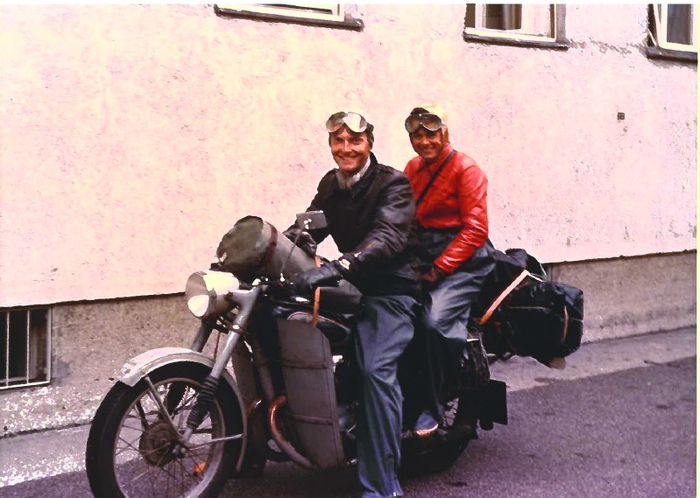Mix together opportunities, the means for education, mentoring relationships with teachers and leaders, and a bit of luck. Add desire and motivation. The outcome can be amazing and startling.
Elisabeth Rohatsch Gantt began life in Gakovo, now part of Vojvodina, Serbia near the Hungarian border. Education was made available to all children and Elisabeth completed the first three elementary grades. However, her schooling was interrupted in 1944 with the advance of Communist partisans and the chaos of World War II. At the end of the war, she, along with other members of her family—her mother, four-year-old brother, grandmother, aunt, and five-year-old cousin—spent time in refugee camps and farms in Czechoslovakia. Living with constant hunger and fear, they were finally relocated to the Soviet Occupation Zone of East Germany.
Luck and planning led to a successful, illegal escape to the British Occupation Zone on the second try; they stayed first in a reconfigured Dachau camp in the American Occupation Zone and were eventually housed in a room at a family farm in Bavaria.
Asked what she learned from these experiences, Elisabeth said the answer was simple: “It clarifies life’s priorities and keeps one from getting lost in trivia.”
Elisabeth and her brother were considered U.S. citizens because their mother had U.S. citizenship. But to remain eligible for U.S. citizenship Elisabeth had to leave Europe and be in the United States before the end of her 16th year. The small family managed to immigrate to Chicago in time for Elisabeth’s citizenship eligibility to remain in effect.
“I spoke little English and learned the language from “Dick and Jane” readers and from comic books that associated words with images,” Elisabeth recalls.
Mrs. Hawkes, a biology teacher at Hyde Park High School where Elisabeth was enrolled, was Elisabeth’s introduction to biology and science. Additionally, Mrs. Hawkes planted the idea that Elisabeth could go to college—something Elisabeth’s family could not afford. However, the teacher knew of a small college downstate that provided opportunities for students with meager financial means and who were often the first members of their families to attend college—Blackburn, which combined academics and work.
Blackburn’s low cost, plus scholarship dollars from her high school principal and another teacher, made it possible for Elisabeth to cover her first year’s expenses.
“If it hadn’t been for Blackburn, I couldn’t have attended college!”
Elisabeth remembers: “Women had a difficult time obtaining the money needed for college since we could not get the higher paying summer work the men did. However, I was able to come back to Blackburn each fall because of summer work placements that Blackburn made for students—like providing summer childcare at peoples’ homes, or waitressing at Michigan resorts.
Elisabeth credits Dr. William Werner with nurturing her interest in science and biology. One of her Work Program assignments was working for Dr. Werner as his teaching assistant. She learned that it was not just the science classes that were important. “Dr. Werner was involved in science societies and wrote a science column for the local paper. He was involved in the community. His work with science outside the classroom, showed me the importance of connecting, teaching, and being a part of something greater than myself.”
Blackburn was also especially important to Elisabeth personally. She met her future husband, Raymond Gantt there, who was also a student in the sciences. They married shortly after graduating from Blackburn, and both went on to earn PhD degrees in their chosen fields. As active research scientists they attended many national and international meetings over the years, such as in Japan. (See photo, above.)
Elisabeth’s career led to numerous scientific awards for her teaching and plant research, including being named to Blackburn’s Science Wall of Honor. Perhaps the most prestigious recognition of her work was being elected to the National Academy of Sciences. [Just a side note—Blackburn has had four alumni elected to the National Academies of Sciences and Engineering—unheard of for a school Blackburn’s size.]
Elisabeth and Raymond Gantt committed themselves to helping students who, like them, wished to attend college but had little means. They worked with Blackburn’s Institutional Advancement staff to establish the Gantt/Rohatsch Scholarship Fund. Over the years, their annual contributions to the fund, along with the endowment fund’s earnings, helped the fund grow to assist more students.
Elisabeth is grateful to Blackburn for the excellent education she received, and especially for professors like Dr. Werner who motivated his students to grow in their fields. Blackburn also kept her busy enough that she had little spare time to have to “kill.” All that she gained from Blackburn made her competitive in her graduate school years and her research projects. It also led her to become a pioneer woman in the sciences during a time when men dominated the field.
“I had the perfect combination of academics, work, and service at Blackburn—an experience that was invaluable. Ray and I started with nothing when we came to Blackburn, and we’ve both had extraordinarily successful science careers since then. Blackburn gave us our start!”
Together, the Gantts established the Gantt/Rohatsch Scholarship Fund, which provides scholarships to students majoring in the sciences. The scholarship fund has benefited 55 students with a total of more than $123,000.
